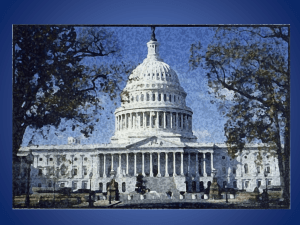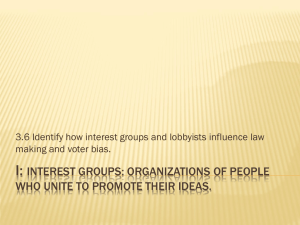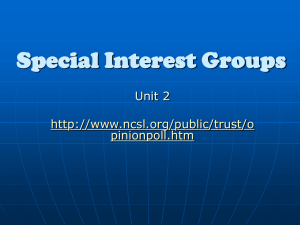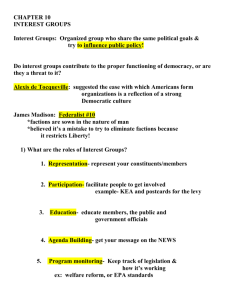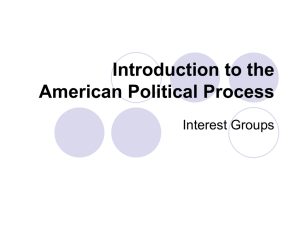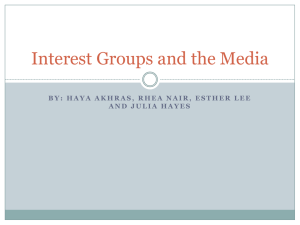Interest Groups
advertisement
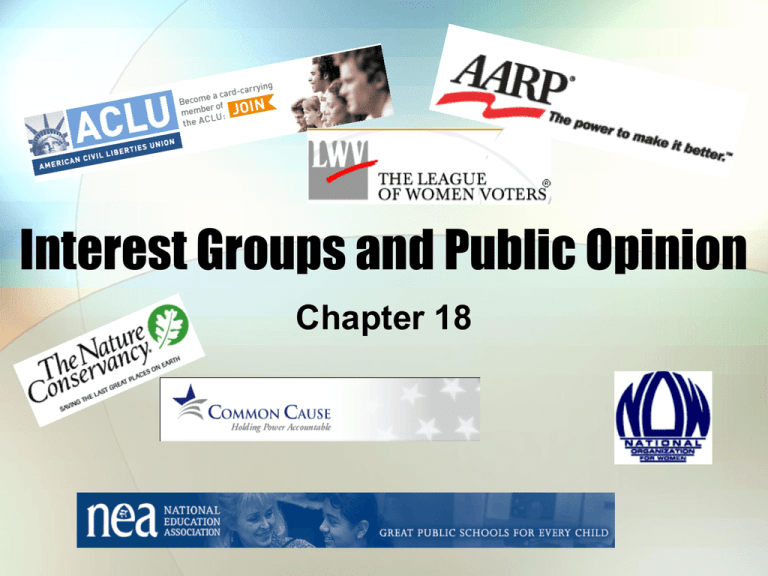
Interest Groups and Public Opinion Chapter 18 Defining Interest Groups: Factions • James Madison: • “factions” – groups united to promote special interests • adverse to the rights of other citizens and the community • Believed the Constitution would protect society from factions Defining Interest Groups: Political Parties •Nominate candidates for office and try to win elections •Broad based organizations •Consider issues facing all Americans •“catch all” Defining Interest Groups 1. Share common goals and organize to influence government 2. Specific problems or issues 3. Unite like-minded people from all over the country 4. Purpose: Communicate “wants” to government leaders – influence public policy Defining Interest Groups 5. Strength in numbers • Government will respond better to large groups than individuals • Organization Why Join? • Economic interests • Individual beliefs, values, or attitudes (political) • Non-political (social) Who Joins? • Upper income levels • Who is looking out for the rest of us? Types of Interest Groups • Business and Labor • (AFL-CIO, National Association of Manufacturers, United Mine Workers) • Agricultural Groups • (NFU – National Farmers’ Union) • Others • Professional (ABA), Environmental (Sierra Club, Greenpeace), Public Interest (Common Cause), Government How does an IG work? • Generating Public Pressure – trying to influence the government by using public opinion on an issue • Using Constituents as Lobbyists • Media Campaign • Building Alliances – forming alliances with groups who share a policy goal How does an IG work? Limitations • Different groups have different, sometimes conflicting goals • Larger IGs have more diverse interests • Smaller IGs have more narrow goals Interest Groups: The Positive • Individual citizens can influence government beyond just voting • Increase the interest and participation of voters • Gives minority groups access to all branches of the government • Continued expansion of interest groups is expected Interest Groups: The Negative • Power of interest groups greater than ever before • Raise and spend large sums of money to support candidates and parties • This support buys access and the internet is a great tool for rallying the troops Major Special Interest Groups • National Association for the Advancement of Colored People http://www.naacp.org • American Federation of Labor-Congress of Industrial Organization http://www.aflcio.org • American Medical Association http://www.ama-assn.org/ • National Education Association http://www.nea.org/ Affecting Public Policy Lobbyists • What is lobbying? • Direct contact with lawmakers or government leaders • What is a lobbyist? • Representative of an interest group • Direct influence by an IG Who is a Lobbyist? • Paid by the interest group • Must register with Congress • Must file reports to disclose activities • Must estimate salary from the group they represent • Many lobbyists are former government officials • http://www.opensecrets.org/lobbyists/ov erview.asp?txtindextype=is What Does a Lobbyist Do? • Meets with Congressmen and women • Provide reports, statistics, and info. • Gifts to Senators (under $50), no gifts to Representatives • Testify before congressional committees • Help members of Congress draft bills • • • • • • • • • • • • • • • • • • • • • • AARP – American Association of Retired People* Christian Coalition* NARAL – National Abortion Rights Action League* ACLU – American Civil Liberties Union* Club for Growth NEA - National Education Association* Council on American-Islamic Relations National Resources Defense Council ABA - American Bar Association* Emily’s List NOW – National Organization of Women* American Conservative Union Environmental Defense Fund NRA – National Rifle Association American Farm Bureau Family Research Council PETA – People for the Ethical Treatment of Animals AIPAC - American Israel Public Affairs Committee Brady Campaign to Prevent Gun Violence previously known as Handgun Control, Inc. Public Citizen* AMA - American Medical Association* • • • • • • • • • • • • • • • • • Moveon.org Sierra Club ATLA - Association of Trial Lawyers of America NAACP – National Association of Colored People* US Chamber of Commerce The Business Roundtable AFL-CIO – American Federation of Labor – Congress of Industrial Organizations* NAM - National Association of Manufacturers* Veterans of Foreign Wars* Planned Parenthood ASPCA – American Society for the Prevention of Cruelty to Animals National Wildlife Federation MADD – Mothers against Drunk Driving American Association of People with Disabilities GLAD - Gay & Lesbian Advocates & Defenders League of Women Voters National Immigration Forum Lulac Political Action Committees • PAC- organization that collects money and provide financial support for a candidate • Corporations and labor unions cannot directly contribute to candidates, so they set up PACs Laws to Govern PACs • PACs must register with the government • Must raise money from at least 50 contributors • Must give to at least 5 candidates http://www.opensecrets.org/527s/types.asp Laws to Govern PACs • Can give $5,000 directly to a candidate • Can spend unlimited amount on the campaign, as long as it does not work directly with candidate Buckley v. Valeo • 1976 Supreme Court decision • FEC cannot limit the number of PACs set up by divisions of a corporation or union • National, state, and local spending on a candidate was free speech, could not be limited Types of PACs • Affiliated: tied to corporation, trade group, etc. (about 70% of PACs) • Nonconnected: groups interested in a cause and are not connected with an interest group (about 25% of PACs) • Usually raise more than affiliated PACs by direct mail Contributions to PACs Graphs on page 510 • What has the general trend been in Total PAC spending since 1978? • By about how many dollars did PAC spending increased between 19961998? • By how much did the number of PACs declined between 1996 and 1998? • Which type of PAC spent the most $ in 1999? DAY 2 What is Public Opinion? • Attitudes and ideas that significant numbers Americans hold about government and politics • 3 factors: • Diversity • Communication • Significant Numbers Where does it Come From? • Political Socialization 1. 2. 3. 4. 5. 6. 7. Family and Home School Peer groups Personal characteristics Mass Media Other (govt. leaders, IGs, churches) Political Efficacy Political Culture • Set of basic values and beliefs most citizens share • Ex) freedom, liberty • Public Opinion fits within our Political Culture • Ex) Government regulations Political Ideology • Liberal • Conservative • Moderate • Libertarian Measuring Public Opinion Non-Scientific • Political Parties • Interest Groups • Mass Media • Letter Writing • Email, telephone, etc. • Straw Polls Scientific Polling • Sample Populations •Representative sample, random sample • Sampling error •Ex) +/- 3 • Sampling Procedures •How do they sample the whole country? Scientific Polling • Poll Questions •How are the questions worded? • Mail and Phone Polls •Some people refuse to be polled • Interpret the Results •Dishonesty, uninformed opinions, but.. •They are a snapshot of public opinion Scientific Polling • Sample Populations •Representative sample, random sample • Sampling error •Ex) +/- 3 • Sampling Procedures •How do they sample the whole country? Election 2008 Polls • McCain http://pollingreport.com/l.htm#McCain • Obama http://pollingreport.com/o.htm • Clinton http://pollingreport.com/C2.htm#Hillary • Democratic Nomination http://pollingreport.com/wh08dem.htm • General Election http://pollingreport.com/wh08gen.htm

